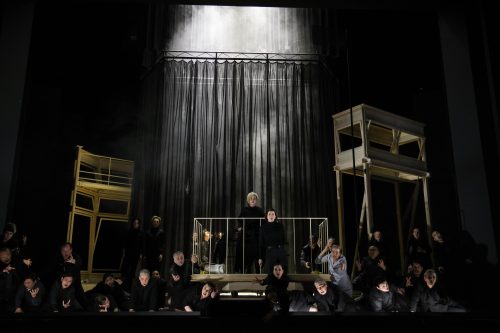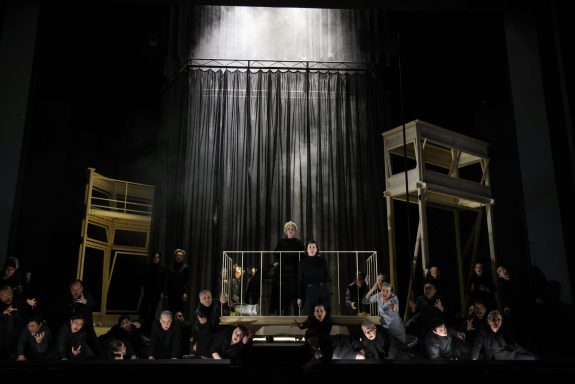 Germany Mozart, La clemenza di Tito: Soloists, Chorus and extras of Theater Bremen, Bremer Philharmoniker / Sasha Yankevych (conductor). Theater Bremen, 28.3.2024. (DM-D)
Germany Mozart, La clemenza di Tito: Soloists, Chorus and extras of Theater Bremen, Bremer Philharmoniker / Sasha Yankevych (conductor). Theater Bremen, 28.3.2024. (DM-D)

Production:
Director – Marco Štorman
Stage design – Frauke Löffel
Costume design – Axel Aust
Lighting design – Norman Plathe-Narr
Choreography – Alexandra Morales
Dramaturgy – Frederike Krüger
Chorus director – Karl Bernewitz
Cast:
Titus Vespasiano – Oliver Sewell
Vitellia – Sarah-Jane Brandon
Servilia – Elisa Birkenheier
Sesto – Ulrike Mayer
Annio – Adèle Lorenzi
Publio – Hidenori Inoue
The opera’s title suggests that it is about a desirable human characteristic – clemency. It is the ability for a person in a position of power to forgive an obvious or assumed wrongdoing perpetrated by another person against an established practice or law. Against that background of forgiving, clemency means that the person in power does not take the option of punishing the offense in the strict way possible: instead the punishment is decidedly less strict or is waived altogether. Mozart composed the opera over a period of two months from commission to opening night shortly before his death, on the occasion of the crowning of Leopold II as King of Bohemia. In their concise and well-written programme notes, dramaturg Frederike Krüger and director Marco Štorman contextualise the opera and their approach to its production regarding the historical emperor, Titus, and the clash between his reportedly mild reign, which made him a great Emperor, and his time before those two years as Emperor, where he was a brutal warmonger, butcher and rapist. The production thus aligns the opera’s plot with the social criticism inherent in many of Mozart’s operas.
The clemency of the title thus became an obvious means and tool of power. Frauke Löffel’s set consisted of two sets of windows at opposite ends of a slightly raised wooden level on the revolve. The windows on one side did not have glass, the construction opposite featured a set of window frames with a large, tilted sheet of plastic glass in front of it, against which several characters can lean. The chorus, led by the servant Publio, consisted of men and women who functioned as the state’s spies. They were everywhere, looking and listening in, silently threatening, not at all invisible, and frequently reporting to various others. The chorus acted with dedication and sang with commitment under the company’s new chorus director, Karl Bernewitz. Strikingly, Titus did not seem comfortable with his role as emperor, with the kind of power it gave him (compared with the powers of the warmonger he had become accustomed to). At his first entrance he seemed ill at ease with wearing the wide state robes, while for his acts of clemency he appeared even more out of place in female attire: a sleeveless, extremely wide hoop petticoat. The courtiers around him wore simple dark or black outfits.

Sasha Yankevych made his company debut as First Kapellmeister. He demonstrated a keen awareness of the intricate texture of Mozart’s music. The tempi were swift and energetic most of the time, not sagging in inherent tension for slower passages. Nuances were finely chiselled, support for the singers was strong throughout, and the orchestra clearly worked well with him. As Tito, Oliver Sewell’s voice suits the leading tenor role in this late Mozart opera seria very well indeed. It was light enough for Mozart, but not as light as the kind of voice that is ideally suited to singing Ferrando (Così fan tutte) or Don Ottavio (Don Giovanni). Sewell sang with ease across registers, and with a high level of musicality. While Tito is the title character, the central one in this production was his friend Sesto. Ulrike Mayer portrayed Sesto as a man critically torn between two kinds of love: there is the love for Tito, the Emperor, with an implicit conflict or at least tension between friendship and the expectation of loyalty in terms of social hierarchy. Then there is Sesto’s passion for the woman he loves, Vitellia, who has urged him to take action against Tito. Mayer’s astute portrayal of that clash of interests and its ongoing and shifting impact on Sesto’s state of mind was very well matched in her vocal characterisation. Her mezzo-soprano is very warm and expressive, and she was able to mould the voice to show us the tension between conflicting emotions. Acting and singing combined into a very moving portrayal.
Elisa Birkenheier sang Sesto’s sister, Servilia, the character’s name implies loyalty towards family and position within society. True to her name, Servilia is prepared to obey the emperor when he chooses her as his wife. However, she is also independent enough to alert him to the fact that she already loves someone else. Birkenheier portrayed the nature of this character as both obedient and self-confident, as well as courageous (without realising it), determined and independent very well indeed. Through the imaginative use of her voice, she added to the fine-tuning of this characterisation, shading the generally beautiful sound of her voice to become sweet or steely as necessary.
Sarah-Jane Brandon rose to the demands the plot and music had in store for the character of Vitellia, Tito’s daughter. As with the other cast members, director Štorman led her to bring out the various shades of her emotions with a high level of clarity. She loved, hated, was vengeful, regretted, and despaired across a range of challenging recitatives and arias. New to the company of Bremen, mezzo-soprano Adèle Lorenzi sang Annio, Sesto’s friend, with whom Servilia is in love (and vice versa). In terms of her acting, she was on a par with her colleagues as a simple and straightforward man who has clear ideas about friendship and love. Her mezzo-soprano is different to that of Mayer – it came across as more robust and earthy, a good casting decision. Hidenori Inoue gave Publio, head of the secret police in this production, a note of mystery since he was always appearing unexpectedly, this was matched by the flexibility of his voice and Inoue shaded his bass in striking nuances of darkness.
Daniel Meyer-Dinkgräfe
